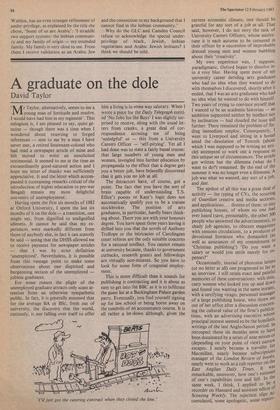A graduate on the dole
David Taylor
`Mr Taylor, alternatively, seems to me a young man of fortitude and resolve. I would have had him in my regiment'. This eulogium is, I am pleased to say, quite ge- nuine — though there was a time when I wondered about resorting to forged references — sent to me by a man I have never met, a retired lieutenant-colonel who had read a newspaper article of mine and felt moved to write an unsolicited testimonial. It seemed to me at the time an extraordinarily good-natured action and I hope my letter of thanks was sufficiently appreciative. It and the letter which accom- panied it (containing remarks critical of the introduction of higher education to pre-war Bengal) remain my most delightful souvenirs of unemployment.
Having spent the first six months of 1982 at Oxford University, I spent the last six months of it on the dole — a transition, one might say, from dignified to undignified idleness. It cannot be said that my ex- periences were markedly different from those of anybody else, in fact it can scarcely be said — seeing that the DHSS allowed me to receive payment for newspaper articles — that I was by strict definition `unemployed'. Nevertheless, it is possible from this vantage point to make some observations about one dispirited and burgeoning section of the unemployed jobless graduates.
For some reason the plight of the unemployed graduate attracts only scant at- tention from an otherwise sympathetic public. In fact, it is generally assumed that for the average BA or BSc, fresh out of university, the discovery that the world, curiously, is not falling over itself to offer him a living is in some way salutary. When I wrote a piece for the Daily Telegraph entitl- ed 'No Jobs for the Boys' I was slightly sur- prised to receive, along with the usual let- ters from cranks, a great deal of cor- respondence accusing me of being `unhelpful' or — this from a University Careers Officer — 'self-pitying'. Yet all I had done was to state a fairly banal truism: that large numbers of young men and women, inveigled into further education by propaganda to the effect that a degree gets you a better job, have belatedly discovered that it gets you no job at all.
The detractors have, of course, got a point. The fact that you have the sort of brain capable of understanding T.S. Elliot's poems or Kant's logic does not automatically qualify you to be a trainee stockbroker. The position of arts graduates, in particular, hardly bears think- ing about. There you are with your honours degree. You have spent three years having it drilled into you that the novels of Anthony Trollope or the intricacies of Carolingian court reform are the only suitable concerns for a rational intellect. You cannot remain at university because, thanks to government cutbacks, research grants and fellowships are virtually non-existent. So you have to look for some form of congenial employ- ment.
This is more difficult than it sounds for publishing is contracting and it is about as easy to get into the BBC as it is to infiltrate the guest list at a Buckingham Palace garden party. Eventually, you find yourself signing up for law school or being borne away on the tumbrils of an accountancy course. It is all rather a let-down although, given the
`I''d just got the catering contract when they closed the line.'
current economic climate, one should be grateful for any sort of a job at all. That said, however, I do not envy the task of University Careers Officers, whose misfor- tune it is each autumn to be cornered in their offices by a succession of improbably dressed young men and women babbling about their 'creativity'.
My own experience was, I suppose, paradigmatic. Oxford began to dissolve in- to a rosy blur. Having spent most of my university career deriding arts graduates who had no idea what they wanted to do with themselves I discovered, shortly after it ended, that I was an arts gradueate who had no idea what he wanted to do with himself.
Two years of trying to convince myself that I wanted to be an academic historian — an ambition supported neither by intellect nor
by inclination — had clouded the issue still further. There remained the problem of fin-
ding immediate employ. Consequently, I went to Liverpool and sitting in a hostel amid the • desolation of Toxteth (about which I was supposed to be writing an arti- cle) attempted to work out a response to this unique set of circumstances. The article
got written but the dilemma (what do I want to do?) remained. By the end of the summer it was no longer even a dilemma. A job was what we wanted, any sort of a job, and fast.
The upshot of all this was a great deal of activity — the typing of CVs, the scouring
of Guardian creative and media sections,
and applications... dozens of them: to tinY publishing houses, of whom no one had
ever heard (save, presumably, the other 300
people who answered the advertisement), to shady job agencies, to obscure magazines with tenuous circulations, to a producer of devotional literature who demanded (as well as assurances of my commitment to `Christian publishing') 'Do you want a salary or would you settle merely for ex- penses?' Occasionally, instead of photostat letters (or no letter at all) one progressed as far as an interview. I still retain exact and painful
memories of these conversations: with thin, catty women who looked you up and down and found you wanting in the same instant,
with a terrifying virago, personnel manager of a large publishing house, who threw file
out of her office after a discussion concern- ing the cultural value of the firm's publica- tions, with an advertising executive whose principal interest seemed to be the homiletic
writings of the late Anglo-Saxon period. In retrospect those six months seem to have been dominated by a series of near misses or
(depending on your point of view) narrow escapes. I nearly became a travellerfor Macmillan, nearly became subscriptions manager of the London Review of books, nearly went to work as a cub reporter on the East Anglian Daily Times. It Was remarkable, moreover, how one's estimate of one's capabilities rose and fell. In the same week, I think, I applied to be a recorder on Hansard and assistant editor of Scouting Weekly. The rejection slips ac- cumulated, some apologetic, some reprov-
ing, all of them demoralising. Finally, and fortunately, I got a job in PR.
Meanwhile, the problem of these thousands of highly educated young men and women with nothing to do remains. It is estimated that one in five of last year's graduates is still looking for work. A friend of mine has, to my knowledge, sent in 102 Job applications. And of course, it is an ex- cellent idea that graduates should have to get to grips with the real world, realise that society does not owe them a living, and so on.
The point, one realises, about an arts degree is that it fits you to do precisely nothing. Obviously, it teaches you to think, confers certain other nebulous intellectual
qualities, but it bestows on you nothing concrete; which is why, in the limited jobs market that now exists, all those bright, clever, 'creative' English students are so sadly disadvantaged. I am afraid I am suffi- ciently reactionary to think that.this is quite a good idea, that three years spent (say) reading Trollope is rather better for a per- son's mental development than some purely Utilitarian course. This is an unfashionable view, of course, and I am not so optimistic as to believe that very many people will agree with me. And it will not, unfortunate- ly, help all those thousands of unemployed graduates, beguiled into further education by the promise that a degree would somehow get them a job.







































 Previous page
Previous page